home | internet service | web design | business directory | bulletin board | advertise | events calendar | contact | weather | cams

|
Historical Closing 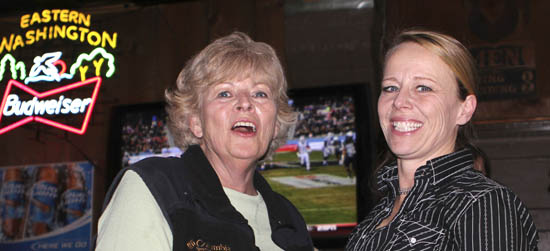 Owner Robin Madison, left, and Lisa Priest take a momentary break from waiting tables. Madison typically started her day at the saloon and cafe at 3:30 in the morning. Owner Robin Madison, left, and Lisa Priest take a momentary break from waiting tables. Madison typically started her day at the saloon and cafe at 3:30 in the morning.It’s pitch dark and well before dawn but already pickups are parked outside the Antlers Saloon and Café in Twisp. Owner Robin Madison, coffee pot in hand, has been here since 3:30 a.m. to be ready “for my guys” when she officially opens at 5. Her “guys” are those men at the bar draining their coffee mugs and talking, and that table of quieter guys huddled around the big screen TV watching Fox News. There is a comfortable, sometimes lifelong, familiarity among those who drop by the Antlers—no matter what time of day or night. But New Year’s Eve (Dec. 31) is closing day for this valley institution that’s been mirroring local culture since at least the early 1900s. It’s a place filled with stories of brawling loggers and gunshots, crazy drunken stunts and multi-generational family dinners—all overseen by a row of mounted deer, moose, bison and sheep heads. There simply is no other place quite like it. 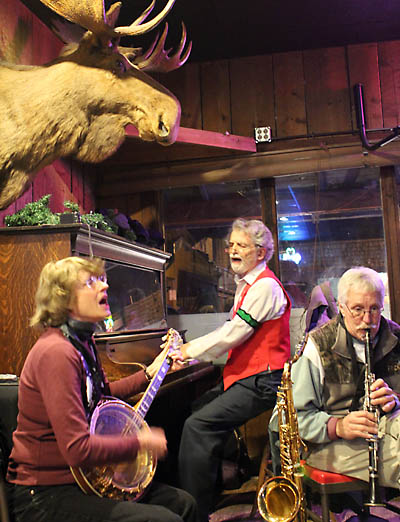 Playing and singing their hearts out under the moose for the last time on Monday (Dec. 30) are Diana Hottell on banjo, Bill Hottell on piano and Wayne Mendro on clarinet. Playing and singing their hearts out under the moose for the last time on Monday (Dec. 30) are Diana Hottell on banjo, Bill Hottell on piano and Wayne Mendro on clarinet.“The Antlers is Twisp and Twisp is the Antlers. That’s how I feel,” says Diana Hottell, whose 41st anniversary of playing music there coincides with closing day. Madison, who has worked seven days a week since she bought the place in 1994, describes herself as “one of those people who does everything by the heart,” which is partly what’s led to closing the doors. She’s not willing to talk about the contentious divorce and its financial fallout, but says she has no choice. “All my customers know the story,” she adds, referring to the people who most matter. The building is to be auctioned off at a foreclosure sale at the Okanogan County Courthouse on Feb. 14, 2014, she says. Most of her 10 employees have picked up other jobs. “People have been here in droves the last three days,” Madison said on Monday, as news of the closure drifted around they valley. When it reached the ears of Bill and Diana Hottell, a final performance by the Hottell Ragtime Band was quickly organized. The Hottells moved to Twisp in 1972 and wandered into the old Antlers tavern on New Year’s Eve so Bill could play a piano. “Bob Brandenburg owned it at the time and he said, ‘It’s New Year’s Eve. How about playing tonight?’” Diana recalls. Thus began a 41-year gig that started with the Hottells playing four nights a week, then two nights a week for 17 years and in recent years more sporadically. “We came from Alaska where we made tons of money in tips,” says Diana. In Twisp they were lucky to get $50 a night from the tavern owner plus a few bucks in tips. “Ranchers and loggers were lousy tippers,” adds Bill. As a “hippie newcomer” he also remembers getting his beard pulled—a favorite display of contempt by the old-time regulars at what he considered “the toughest bar” in town. Brawling was common sport. 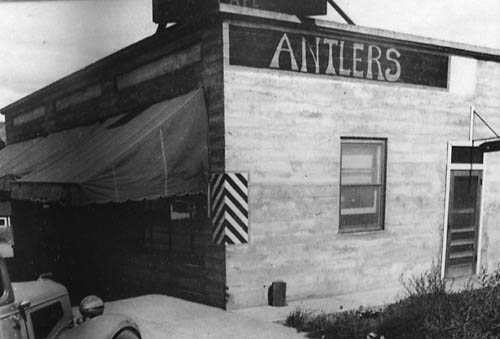 This photograph of the Antlers taken in 1936 is one of many historic photographs on the wall. The wooden Twisp Hotel stood on the site until the fire of 1924 destroyed the town. This photograph of the Antlers taken in 1936 is one of many historic photographs on the wall. The wooden Twisp Hotel stood on the site until the fire of 1924 destroyed the town.Bill recalled that one night “Danny Days took on the whole Gordon family—all four of them.” It took awhile for the Gordons to get him pinned down because he was so tough. Day’s mother-in-law told Bill, “You know that Danny is a real horse’s hangdown.” Back in those days the floors were pock-marked from the loggers’ cork boots. “This town used to be jumping until about 2 a.m. because of the [Wagner] mill,” says Diana. “One shift would be getting off and the graveyard shift starting. We played from 9 p.m. to 1 a.m. and the town was just jumping.” Poker—“real poker”—was played regularly. “Something has terribly changed,” she adds. “Maybe it’s TV. Maybe the mill being gone.” “It’s been such a pillar in the valley,” adds Bill. Jim Lince, Twisp born-and-raised and an Antlers regular, says his late mother Lois Lince tended bar at the Antlers in the late ‘50s and early ‘60s. In fact, she was there the night of the famous deer shooting incident. 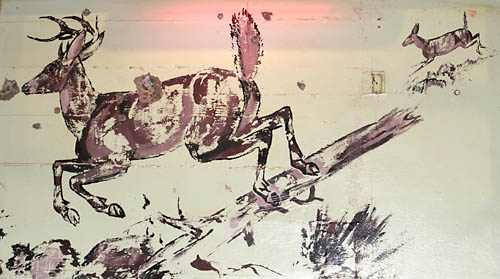 The bullet–studded mural that takes center stage in one piece of unforgettable Antlers’ lore that involves a few drinks and a few bullets. The bullet–studded mural that takes center stage in one piece of unforgettable Antlers’ lore that involves a few drinks and a few bullets.As Lince tells it, then-owner Stan Nickell and Billy Paradis, “a little old crippled guy who always carried a .38 in his back pocket,” had a few drinks before deciding to find out who could best shoot the deer in the painting on the wall—the cement wall. Billy pulled the gun out of his pocket and the two took turns shooting, Lince says. “Mom ducked behind the bar.” No humans were hurt, although at least some of the shots hit that old leaping white-tail that still hangs on the wall. “They used to ride horses into this place and everything,” Lince adds. He, like other regulars, has no idea where he’ll go for morning coffee and lunch when the door shuts. The facts of the Antlers’ origins are a bit sketchy. The Twisp Hotel that stood on the site until a 1924 fire destroyed the town, had a bar. And there is a photo dated 1915 of the Antlers on the wall. Some say the bar was the first building rebuilt after the fire. When Madison bought the place in 1994 she was moving here from Tacoma with a background in marketing but “had never been a waitress and never poured a beer.” She was born and raised in St. Maries, Idaho, another logging town, so she says she understands the struggles local people face. “I have so much respect for the old-timers who built this community and made it what it is,” she says. That’s one reason she’s worked to give the Antlers “a friendly atmosphere with the wood stove, a place people can come and just visit with friends.”
The Antlers she bought opened at 9:30 a.m. It served beer and some wine. There was an about-to-close restaurant next door, so she added a limited menu of hamburgers and broasted chicken. For the fall ’94 hunting season she added the infamous hunter’s breakfast—“a one-third-pound ham steak, three eggs, a shovel full of hash browns, toast and coffee or a red beer.” A new tradition was born. Another Antlers’ fixture is the Wednesday night $6.99 steak dinner. “You can’t buy it at the store for that,” she admits, “but I’ve always tried to keep reasonable prices so people could have a place to go.” “The pull tabs have always been here . . . We’ve always had a gambling license.” But there once were pool tables. And Lince recalls the days when there was an ice-cream and soda fountain in the space where musicians have played more recently. An electrical fire in August 1995 led to a remodel that included new coolers, flooring and wiring, Madison says. That same year she served as Twisp Chamber of Commerce president. And in about 1998 she revived the Fourth of July parade. “That’s my favorite holiday,” she explains. “I called the horsemen. I called the firemen.” Anyone who wanted to participate could just show up. 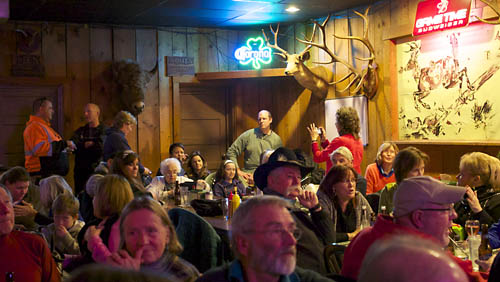 Since about 2000, when it changed from a tavern to a saloon and café, the Antlers has been an “Everybody welcome” kind of place for families, cowboys, hunters, the athletic set—whatever—as this photograph taken Monday night shows. Since about 2000, when it changed from a tavern to a saloon and café, the Antlers has been an “Everybody welcome” kind of place for families, cowboys, hunters, the athletic set—whatever—as this photograph taken Monday night shows.Madison wanted to create a family-friendly place so about 2000 she got a liquor license and changed the name to Antlers Saloon and Café. Children are not allowed in taverns but they are welcome in restaurants with liquor licenses. New laws and personal habits have brought some changes over the years. “People don’t drink like they used to drink and we do not over-serve,” she says. But it was the smoking ban in 2006 that delivered the most significant financial wallop, Madison estimates it was about a “$300,000 a year” loss of business. “It was a smoking establishment . . . People used to come in, have a few drinks, dinner and play some pull tabs. After the no-smoking law they’d come, have one or two drinks and leave.” Madison has arrived at the Antlers at 3:30 a.m. for years. Officially the doors open at 5 in the morning “unless somebody’s having trouble sleeping. They know I’m here.” There is no set closing time. 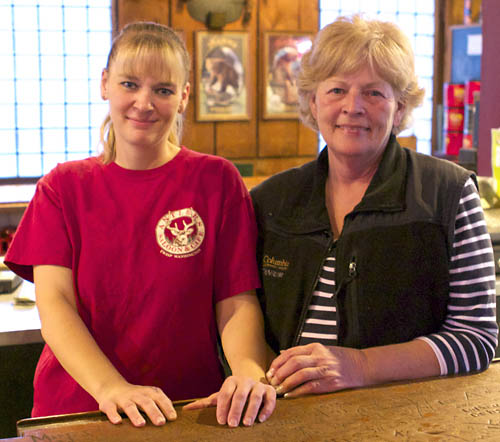 Alicia Dammann, left, poses behind the bar with her mother, Robin Madison, on the morning of closing day. Dammann moved to the valley in 1996 and has worked at the Antlers ever since. (Her sister, Melissa Jacot, moved to the Methow in 1994 and worked with her mother until she got married and moved to Wenatchee.) Alicia Dammann, left, poses behind the bar with her mother, Robin Madison, on the morning of closing day. Dammann moved to the valley in 1996 and has worked at the Antlers ever since. (Her sister, Melissa Jacot, moved to the Methow in 1994 and worked with her mother until she got married and moved to Wenatchee.)Madison allows she is “tired,” and while still a couple years shy of a full Social Security check, she plans to kick back, starting with two weeks off with a bit more sleep. Taking more time “to enjoy my grandchildren” is her next order of business. That would be daughter Alicia’s two girls, Meagan, 14, and Hailey, 11. They can expect a cheering grandma at their basketball, volleyball and swim team events. Madison says she could easily get choked up before midnight on New Year’s Eve, but she’s been keeping a stiff upper lip. “This community made me feel welcome from the day I came and I just thank them from the bottom of my heart,” she says with only a few hours to go before the next chapter of her life—and the Antlers’—begins. And if the valley is filled with rich memories of the place, that’s how she thinks it should be: “That’s what we do. We make memories and carry them with us.” 12/31/2013 Comments Karen: Excellent work! You really captured the spirit and essence of the Antlers and its relationship to the community. Nice interviewing, great pictures, nice job. Thanks so much, Wayne and Linda Mendro Twisp
|